|
1240 WINN |
|
WINN Photos |
WINN Surveys |
WINN DJs |
WINN Memos |
WINN Ink
WINN Newsletters
| WINN Airchecks |
WINN Production |
WINN Jingles
Radio Trivia: WINN switched from
country to big bands/adult standards in February 1981.
| |
|
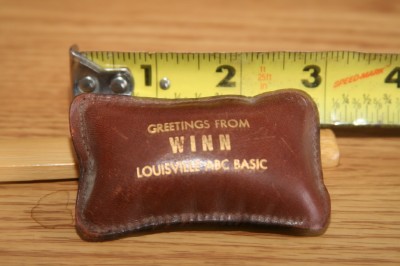 |
| Tim Cox writes about
the above item: "I've had this sitting in a drawer for years
after finding it among items my dad had before he passed away.
It is made of leather, tightly stitched around, and seems to
have sand inside." |
|
|
Know
anything more about this station? Have any WINN airchecks, photos or
promotional material?
Drop us a line. |
|
WINN Surveys |
|
June 24, 1967 - Outside |
June 24, 1967 - Inside |
|
December 31, 1971 |
|
Top Hits of 1974 |
Top Hits of 1975 |
|
November 12, 1976 |
|
 |
|
WINN DJs |
|
Bucks Braun writes:
"Congratulations and good luck on this project. It's very exciting to have
some folks remember a couple of fun radio markets that produced so many
fine stations and personalities. Especially today in the era of bland
corporate formatting and voice tracking.
"I went into WINN in
Louisville in the summer of 1971 after getting out of Ohio University.
Danny King was the PD and I did 10-2. Within a few months, Danny was gone
and Moon Mullins moved into the PD slot. I moved to mornings.
"In late summer '72, the GM
of an AC station in Jackson, Mississippi drove through Louisville, called
and offered me 100 bucks more than I was making to do afternoons at WSLI
there. I took it and moved on. In early '73, I left Jackson to do mornings
in a new format in Phoenix: all news. There I reunited with an ex-girl
friend, Jane Hoffman who was from Madison, Indiana. In '74 her mom died,
and she wanted to be closer to her dad, so we moved.
"I moved back into WINN in
the morning slot, and Jane began a long run at WAVE radio. Moon was PD at
WINN and had put together a great radio station. Middays were done by BJ
Koltee and Al Risen. We also had Karl Shannon who later spent years in
Lexington as a morning power. When Moon moved on, Dickie Braun came in and
became one of the most inventive personalities I've ever heard. We also
had Dan Breedon, who worked overnights for over a decade. He was once
offered another shift and said 'No. These are my people, the cops, cab
drivers and whores!'
"Moon came back for a time,
and then, once more, the big time called and he was off to Kansas City,
and later New York. He was a patient, thoughtful programmer and challenged
me continually. He's a great radio man. BJ Koltee (Richard Upton), who
passed away a couple of years ago, was also a great radio personality. I
can only wish I had some airchecks. I've never heard anyone as good as BJ
at working the phones. And of course, the late Wretched Richard developed
into a Louisville legend.
"In '79, Bluegrass
Broadcasting sold WINN and moved me, as PD and morning guy, along with GM
Max Rein, to its stations in Orlando, Florida. I still miss Louisville,
come back for Derby every couple of years, and do a getaway weekend in the
bar at the Brown Hotel every few months."
Today Bucks Braun is the
morning man on Ohio's
My Classic
Country network.
.jpg)
WINN Mark Ford publicity shot (1961)
David "Mark" Ford writes
from Nashville in February 2010: "Bill Gerson hired me way back in 1961 to
work at WINN. Scarsdale was there then, too. I didn't stay very long but
did work there a bit over a year all together. I went by MARK Ford on the
infamous WINNland bandstand. One of my favorite features of the operation
at WINN was the old stand-up board.
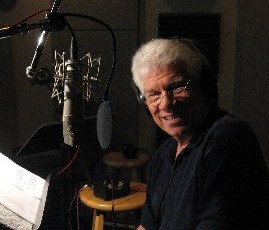
David Ford today
"I'm still active in
voice-actor work in Nashville, but have been away from broadcasting since
1965.
"By the way, Jumpin' Jack
Sanders came to WAKY about the time I got to Louisville. We had previously
worked together back home in Texas at KLTI in Longview when he was known
by his real name, Jim Spence. Here in Nashville, his real-life daughter
Debbie Trimble worked as 'Debbie the Dubber' for ages at Spotland
Productions, where I've done a heavy percentage of my VO work for years."
Moon Mullins writes: "Dave Olson was
Program Director when I was hired to do mornings in June, 1969. When I
arrived he had either quit or been fired. Like now, back then you
sometimes could not tell which. Tom Moore, the GM told me I was PD when I
arrived and increased my pay $5 a week. During my tenure Tom Moore demoted
me to Music Director only and hired a gentleman named Bobby Dark as PD.
Bobby worked at KBOX in Dallas when it was Country. He is the one who
brought in Ken Tuck who worked with him there. Danny King became PD after
Bobby was fired. Danny could recall more about this but somewhere in there
he left and I was PD again.
"I left for KSON in San Diego in December 1974 and returned to WINN in
February 1975. I have told people, 'I went on vacation and took my
furniture with me.' During the time I was in San Diego, Richard Braun was
temporary PD, a position he graciously gave up when I could return.
"While I was still at WINN and shortly before my departure for
Louisville's WTMT in July of 1978 and then on to WDAF in Kansas City I was
'upped' to Operations Manager and Bucks Braun was named PD.
"Randy Michaels and Ted Cramer had told me in 1977 that they would bring
me to Kansas City 'soon.' I quit WINN when I grew weary of waiting. Then,
a month later they called and I bolted WTMT for WDAF."
After a stint as morning man and PD
of WBKR in Owensboro,
Kentucky, Moon Mullins has retired and lives in Texas.
1975 Buck Owens Letter to Moon Mullins
1978 WINN Moon Mullins
Flyer |
|
 |
|
WINN Memos |
|
These memos were sent to the DJ staff from
Program Director Danny King in the early '70s. |
|
DJ
Memo 1, Page 1 |
DJ
Memo 1, Page 2 |
|
DJ
Memo 2, Page 1 |
DJ
Memo 2, Page 2 |
|
WINN Ink |
|
This
article appeared in the Louisville Times on
January 27, 1966 |
|
3,000 OLD RECORDS
COMPLICATE
WINN'S MOVE TO NEW STUDIOS
By Virginia Delavan
Louisville Times
What do you do when Moving Day rolls
around and you've got several thousand old 78 RPM records sitting in your
attic?
WINN radio, which has that problem, hasn't decided.
Dusty, unplayed in a decade, they sit in bookcases and boxes amid a jumble
of other things cast off by tenants of the Speed Building, 333 Guthrie.
On the floor below, WINN's people yesterday were gradually emptying the
studios and offices they've occupied for 10 years.
A short walk away, workmen were installing telephones in WINN's new suite
on the ground floor of the Fincastle Building, Third and Broadway.
The station will be in the north end of the building, along Third Street.
The Kentucky Chamber of Commerce formerly had that space.
In New Quarters Monday
In the early hours of Monday morning,
WINN will leave the old home for good and, at 6 a.m., sign on from the
new.
But what to do with those old records?
"There are probably some collector's items here," mused chief engineer
Melvin Scarsdale, bending over a bookcase full of them.
Scattered around the unheated attic were old school desks, a couple of
wooden doors, light fixtures, and heaps of junk.
Plucking out some of the paper-jacketed 78's, Scarsdale read off the
titles: "Lovely to Look At" by Eddy Duchin; "All My Love" by Dinah Shore;
"Life Is So Peculiar" by Louis Armstrong.
Among the old standards were some less memorable ditties -- Fred Allison's
"Punky Punkin", Bill Snider's "Viola Ray" -- that may have been on the
"Top Ten" lists a decade or so ago.
"We probably had every record Bing Crosby ever made at one time," said
Scarsdale. But station employees, he said, had appropriated them, one by
one for their own collections.
Still, there are perhaps 3,000 to 4,000 of the 78's left.
Probably, Scarsdale said, they will be taken to station WVLK in Lexington,
owned by the same company as WINN, and "sorted out." What will become of
them after that, he doesn't know.
WINN may have kept the old records because it always believed its stay in
the Speed building was "temporary."
The station followed an insurance firm into the fourth-floor quarters and
adapted them, with plywood partitions and other makeshifts, to its own
requirements.
Time passed and the "temporary" stay lengthened. Fingerprints collected on
the walls, once-new equipment grew middle-aged.
Unopened in 3 or 4
Years
Station manager Jim Nathan, leading a
tour of the old place, pulled open a file cabinet, which he said probably
hadn't been opened in three or four years.
Inside was an array of junk -- like the stuff that accumulates in auto
glove compartments and bottom desk drawers. A martini glass, pills, nose
drops, some Happy Chandler buttons from the 1963 campaign, a roll of film
taken in 1959, a record of "Music to Sell Bread By..."
Nathan said the station first began thinking seriously of moving when it
was bought by Lexington financier Garvice Kincaid in 1962 and became part
of his Bluegrass Broadcasting chain. Conveniently Kincaid also owned the
Fincastle Building.
Two or three weeks ago, WINN put its name up in big, blue neon letters on
the Broadway side of the building.
("It's the biggest radio sign in Louisville', Nathan said proudly, "three
stories high.")
Scarsdale's worktable and tools were moved in, leaving him only a chair
and telephone stand back at the Guthrie location.
Wall-to-wall carpeting was laid, walnut veneer paneling placed on the
walls, some records of the 45 and 33 1/3 rpm variety were brought over.
The heart of the studio control room -- a console where records and
commercials are turned on and off -- was installed.
Back at the Speed studios stands the console's less-fully automated
predecessor. It, like some of the other old electronic equipment, has been
sold, but won't be shipped off until the move is completed.
Other pieces will be transferred to the Fincastle Building, along with the
last remaining non-78 records, after WINN signs off at midnight Sunday.
WINN's people are as nervous about moving the delicate equipment as a
housewife would be over a set of heirloom crystal.
They don't dare entrust the job to the moving company that will do the
rest of the work, Nathan said.
Instead, a crew of three or four volunteers will assemble in the pre-dawn
hours and load the equipment into a station wagon.
The bulk of the chairs, desks, filing cabinets and other furniture won't
arrive until later Monday.
But, as Nathan noted, "you don't need furniture to go on the air."
When WINN goes on the air at 6 a.m., announcer Ed Walker will have his
feet on a new carpet and the smell of wallpaper paste in his nose.
"We hope," added engineer Scarsdale with a grin.
 |
|
This
article appeared in the Louisville Times on
November 8, 1967 |
|
WINN Plans Round-Clock
Country Music
By David McGinty
Louisville Times Staff Writer
Starting Sunday, WINN radio will be
singing a different tune.
The station is changing its musical diet, at an approximate cost of
$35,000, to become Louisville's only 24-hour-a-day country music station.
WINN presently programs smoothly arranged, adult-oriented pop music. In
announcing the change-over Rob Townsend, WINN General Manager, said the
station "wasn't doing well at all" with its present format.
Country music has become increasingly popular, and the Louisville area "is
one of the few top 50 markets without a full-time country music station,"
he said.
The station has retained Bill Hudson, a country and western broadcast
consultant in Nashville, to direct the change-over for six months,
Townsend said.
Next week, the station begins a series of promotional stunts to advertise
the change. Ten models, wearing barrels will roam Louisville to give away
candy kisses and memberships to WINN's "Country Club".
Open House Schedule
At 3 p.m. Wednesday, an announcer will
broadcast from atop a 100-foot crane. From 11 a.m. to 6 p.m. Sunday the
station will have an open house session featuring country and western star
Wilma Burgess.
As part of the change, the station will drop its CBS affiliation. "CBS and
country just don't go together," Townsend said, explaining that the CBS
10-minute news program on the hour is too long for most listeners.
The station will trim its news to five minutes on the hour, originating
from a wire service.
The only country music station in the Louisville area presently is WTMT,
which broadcasts from 5 a.m. to 5:30 p.m. WINN will have "less bluegrass"
and more "modern" country music than WTMT, Townsend said. |
|
This
article appeared in Claude Hall's January 15, 1972 Billboard Vox Jox
column |
|
Lineup at WINN, Louisville, now includes
program director Danny King 6-9 a.m., Jack Braun 9-noon, Charlie Bruce
noon-3 p.m., music director Moon Mullins 3-6 p.m., Jim Walker 6-midnight,
and Dude Breeden midnight-6 a.m., with Al Risen and Mike Hublar working
the weekend shifts.
Here's how the Louisville market shapes
up according to the June/July Pulse: From 5 a.m.-midnight WAKY was tops
with 26, WKLO was second with 17, WLOU had 13, WAVE had 12, and WINN had
10, but led the market in men with a 19. WAKY led in women with a 19,
followed closely by WAVE with 18.
From what I see here, WINN is doing
better than it has in 17 million years and WAKY under John Randolph has
become not only good in demographics of men and women, but has got to be
the major exposure influence in the market on rock singles. |
|
This
article appeared in the Today's Living section of the Courier-Journal on
Saturday, September 27, 1975 |
|
Behind the microphone
at country's WINNů
Dick Braun is Wretched Richard
By John Flynn
Courier-Journal Staff Writer
A time or two Dick Braun has wondered
what happens to old disc jockeys. Do they just spin away? Do they go out
to a rock beat? Or are they discarded like worn 45s?
"Sometimes," said Braun, "I think I'm crazy to be a half-wit disc jockey
at my age. I wonder why I'm still doing it. I figure if I had any sense
I'd own my station by now."
Deep down, however, the 46-yeard-old Braun, who is WINN Radio's afternoon,
drive-home disc jockey, knows why he's still playing records instead of
producing or reading news: Its fun.
Behind the mike, hidden from thousands of car-bound country music fans, he
becomes Wretched Richard, fleet of tongue, impish, witty and inventive.
"I guess I'm really two people," he said. "I'm not much good in front of a
live audience because I'm always wondering what they're thinking about my
physical condition. But on the air the real me probably comes alive."
His physical condition is the result of polio which he contracted at the
age of 4. It left him badly crippled and unable to get around without
crutches.
On the air, however, he stands tall, although his talent generally hasn't
been recognized except by those who make their living in this business.
"The little guy over at WINN, Mr. Dickie Braun, is a hell of a jockey,
about as good as they come in this town," said WAKY's disc jockey Bill
Bailey, the renowned Duke of Louisville.
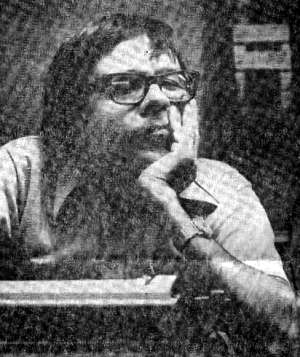
Dick Braun of WINN may think he's "crazy to
be a half-wit
disc jockey," but he's still at it for one reason -- it's fun.
While you wouldn't know it from his long
string of radio jobs, from Ronceverte, West Virginia, to New Orleans, to
Buffalo, to Cincinnati, Braun figures that his polio damage may have held
him back in his career.
It's a business where gall counts as much as talent, where a Bailey
demands star treatment. Braun, on the other hand, never has been forceful
in pursuing the top of the ratings.
"I've always been apologetic and sort of surprised when nice things
happened to me in this business," he said. "Fact is, I haven't felt like a
star since I was a polio kid back in Pittsburgh.
"I was a child star. They ran pictures of me in papers and said what a
nice thing it would be to help out little jerks like me who had polio. I
was a spoiled brat until my parents died and they shipped me off,
screaming and kicking, to a crippled children's home when I was 12.
"But it was the best thing that ever happened to me. I still remember the
old place. It was called the Industrial Home for Crippled Children, but
the woman who ran it called it the Cheerful Home for Crippled Children.
Later she died an agonizing death. I figured the Lord must have smit her
for being corny."
This, of course, is the charming irreverence of Dick Braun, the trait
which may have kept him going in front of a microphone for the past 23
years.
Nothing in his sometimes zany, always odd, way of looking at the world is
too important to gouge it a little, including himself.
"My parents had dreams of me leading a sedentary life, making my living
with pen and scroll in hand," he said. "So I went to the University of
Pittsburgh and majored in accounting.
"I might have been a big, famous accountant by now if I hadn't heard about
this radio job in Ronceverte, West Virginia. I still remember good ol'
WRON. I lived at Mrs. Kearn's rooming house, next to the jail, and had a
sweetheart from Slagle, West Virginia. We used to swing on Mrs. Kearns'
front porch and watch Ronceverte go by."
"From WRON, Braun advanced to WWNR in Beckley, West Virginia, where he did
a little bit of everything including the classical music show on Sunday
night "because I had been to college and could pronounce some of the
names."
In Beckley he bought his first car and learned how to drive it. He also
met a girl named Genevieve Shrewsbury, who later became his wife.
She's the same woman he calls his "300 pounds of love" on his WINN show.
In reality, she's his love, minus about 200 pounds.
It's typical of Braun and his sense of humor that he remembers more about
WWNR than the powerhouse stations which he later worked for, including
WTIX, New Orleans, WKBW, Buffalo, and WSAI, Cincinnati.
"The WWNR station had a little apartment which it rented out to
employees," recalled Braun. I lived there for a while. One Sunday morning
the guy who was supposed to turn on the power for the radio preacher
didn't show up. The preacher knocked on the my door and we found the poor
slob passed out in my bathtub. It made quite a Pearly Gates scene with the
preacher standing over him."
It's not easy to describe Braun's magic on the air, or why it occurs. It's
usually spontaneous and unexpected, straight off the top of his head.
"For the most part I wing it on the air," he said, "although I sometimes
sit down and write a few things when I think that the show's losing all
consistency and continuity.
"Probably, though, I'm better off the air than on," he added, "When the
mike's off, I change the words of the songs I'm playing and make them
dirty. That sometimes helps me to think up something clean to say on the
air.
"But once I've said it, it's forgotten. I have people telling me all the
time that they heard me say something funny, but I never can remember what
it was."
On the other hand, Braun can recall some of the conversations with fans
who call him when he's on the air.
"Like the woman who called the other day," he said. "I told her I was in
an iron lung, and she said that was terrible. I said it wasn't so bad. In
fact, I told her I would have someone bring me over if she would read to
me.
"I like to get calls," added Braun, "but it bothers me sometimes when
people call me up and ask me to play a record for their dying brother."
That's Dickie Braun - not easy to describe but nice to have around. |
|
This
article appeared in the Today's Living section of the Courier-Journal on
Saturday, November 8, 1975 |
|
Putting the country
sound on the air
By John Flynn
Courier Journal Staff Writer
If you're a country music fan in
Louisville, chances are your station is WINN radio which spins country 24
hours a day and has a monopoly on most of the audience.
These facts alone make WINN's music director, Moon Mullins, a dictator of
taste for what you may hear on the air if your music is country.
An example is Faron Young's new single, "Here I Am in Dallas," It hasn't
been played on WINN because Mullins doesn't like the use of the word
"hell" ("Here I am in Dallas, where in the hell are you?") in the song.
"Normally, 'hells' and 'damns' in a song don't bother me," said Mullins,
"but in this instance I felt as if Faron was being frivolous with his
'hells' so I decided that we wouldn't play the song."
"It's not often that Mullins, who also is WINN's noon to 3 p.m. disc
jockey, makes such an arbitrary decision. But since he took over as WINN's
music director from Al Risen a few months ago, there has been a subtle
change in WINN's programming.
Mullins, through tighter programming and less freedom of choice for WINN's
disc jockeys, has given the station a more traditional country sound than
under Risen's music direction.
"I don't think there has been a detectable change in the sound since I
took over," said Mullins, "but we have returned to the basics of radio -
play the hits and balance the music.
"Before I took over," added Mullins, "the disc jockeys had become islands
to themselves. They were playing what they wanted to hear but not
necessarily what the audience wanted."
Under Risen, who left WINN about two months ago in an economy move, WINN's
five disc jockeys were allowed to play three or four album cuts, along
with the current hits, in an hour's time.
Risen, who had the noon to 3 slot currently occupied by Mullins, often
spices his show with cuts from old Waylon Jennings and Willie Nelson
albums.
Jennings and Nelson, along with David Allan Coe and Jerry Jeff Walker,
often are referred to as the "outlaws" of country music as compared to the
traditional Nashville performers.
"What I tried to do," said Risen, "was to take WINN away from 24-hour
'chicken' country, to at least make the outlaws available to the public
and remove some of the 'assembly line' sound from country music.
"In my opinion," he added, "most of the country music stations in America,
including WINN, are still treating their audiences as if they're a bunch
of idiots who can't understand anything unless it's approved by the Grand
Ole Opry."
Cases in point, according to Risen, are Jennings and Nelson - bearded,
long-haired individualists who have ignored the traditional Nashville
route in their careers.
"I was accused of playing too much Jennings and Nelson," said Risen. "They
weren't supposed to appeal to the masses. Yet Waylon was just named
'Country Music Singer of the Year' and Willie had a crossover smash with
'Blue Eyes Crying in the Rain.'
"By programming more album time, it gave us an opportunity to play some of
the great stuff these men have recorded in their careers, because I feel
as if radio stations have an obligation to help performers on the basis of
their music alone."
Risen, for example, attempted to give Nelson's "Phases and Stages" - an
album about a broken love affair with the woman's story on one side and
the man's on the other - some air time.
Mullins, however, took it off WINN's play list.
"Nobody sounds more country than Willie Nelson when he's doing soft,
pretty stuff like he cut on his 'Redheaded Stranger' album," said Mullins.
"On the other hand," he added, "'Phases and Stages' was too hard and
brusque for my ear."
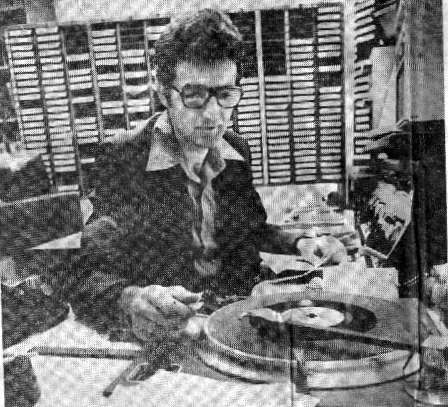
WINN's music director Moon Mullins listening
to new records
This illustrates an interesting point
concerning what audiences hear on country stations; it often depends of
the ear of the music director.
There are no hard and fast smash hits in country unless the record crosses
to the pop lists. A 100,000 seller in country is a monster hit, meaning
that probably no more than 1,000 singles would be sold in the Louisville
market.
Risen often checked the Gavin Sheet, a survey out of San Francisco
indicating what other country stations are playing in making up WINN's Top
40 for a given week.
"It helped some," he said, "but on the other hand you can have a song
that's red-hot in the Atlanta market which you couldn't give away on the
streets of Louisville."
Mullins, meanwhile, composes his Top 40 chart by calling record stores to
check what's selling, by what's requested from the audience and, he added
with a smile, "with my own ear."
While Mullins and Risen have their differences on what's good country,
they agree that the music director's job often is a stab in the dark.
In a busy week the director will receive as many as 100 new singles,
making it an impossibility to listen to all the new cuts.
"It doesn't take a genius to put a new Merle Haggard cut on the air," said
Risen. "His track record is foolproof. Often, though, it's something that
catches your eye - maybe the song title - that causes you to listen to
something new."
As an example, Risen mentioned a song called "Third Rate Romance" which he
helped put on the country charts by playing it on WINN.
"First of all," he said, "that title caught my eye. Then I noticed it was
done by a group called 'The Amazing Rhythm Aces.' I deducted," he
concluded, "that a song with that title, sung by 'The Amazing Rhythm Aces'
just had to be a hell of a tune."
It was, as it turned out. Just as often it isn't, however.
"You can't take this job too seriously," said Mullins. "After all, what
does it mean? It's all pretty much forgotten in two months anyway." |
|
This
article appeared in Billboard on February 25, 1978 |
10 YEARS WITH COUNTRY
WINN Climbing Up In Ratings
By Gerry Wood
LOUISVILLE - Celebrating its 10th anniversary as
a country music station, WINN hopes to continue its slow but sure climb up the
Louisville ratings ladder.
On the air since 1940, WINN was a leading pop adult station in the '40s and
'50s, but was on the wane in the mid-'60s when WAKY and WKLO battled for
Louisville airwave supremacy.
"Since we went country, we've been right back in the fight," comments Bucks
Braun, the station's program director and music director.
The October-November Arbitron shows WLRS, an FM progressive operation with a
superstar format, as Derbytown's top dog. Barking at its heels are two MOR
stations - WAVE and WHAS, the latter the 50,000-watt member of the giant
Louisville Courier-Journal & Louisville Times newspaper/TV/radio complex.
WAKY, undisputed king of Kentucky when Gordon McLendon's chain ran it, is now
in fourth place, followed by WVEZ, and then WINN, which is tied with WKLO and
WQHI for sixth place in the overall ratings. However, WINN points proudly to
the 25-49 adults sector where it scores No. 1.
WINN plays current hits on a very tight list - 30 records or less. "The basis
for going on a record is national action," says Braun. "We're also watching
people who have a good track of records locally who may or may not do that
well nationally. We test new artists or new songs we're unsure of during
nighttime play to gage listener reaction to it."
Braun describes the station's music policy as "a little to the left of middle
of the road" and "contemporary country."
WINN adds one or two records a week. "If it's a big hit, it doesn't matter who
the artist is, or the style - we're going to be with it." Past hits also
receive strong play.
Braun believes the time is right for country music radio. "Since I came here
four years ago, the changes have been enormous. In the early '60s, MOR was a
very big thing. All those stations are playing rock music now, and the adults
have looking for some place to go. Country music is right there waiting for
them."
The country spirit is infectious says Braun. "Watching that three-hour NBC-TV
special a couple weeks ago made all of us here proud to be involved in country
music radio."
WINN is heavy into promotions. "We're probably the promoting-est radio station
around," comments Braun, noting the station frequently uses its 25-foot motor
home, named the WINN Wagon, for promoting advertisers through live broadcasts.
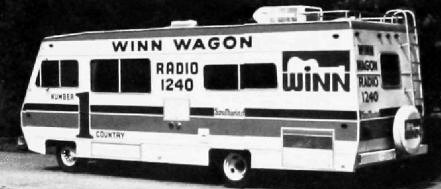
WINN-EBAGO: The 26-foot WINN Wagon motor home
cruises to another Louisville remote.
Noting that many radio maxims
say that remotes are bad for numbers, Braun points out that WINN, during the
last Arbitron, ran remotes against broadcasts of the popular nationally ranked
Univ. of Kentucky football team and scored close to them.
"Remotes evidently didn't hurt us at all."
On remotes, WINN personalities give away WINN bags - litter bags for the car
with coupons for free goods from advertisers, bumper stickers, matches and
other items.
Besides the paid appearances, WINN deejays are encouraged to make free
appearances for charity groups and civic organizations in efforts to "keep
WINN out there in the community in front of the people."
The country outlet gets involved in the Louisville concert scene and recently
gave away $26,000 in cash during the syndicated contest, Country Music Game.
Last August, the station began running a monthly one-page "WINN World" in the
highly circulated Scene section of the Louisville Times. It carries photos and
news items on the station, its air personalities, and country music stars and
their upcoming Louisville concerts.
"Before we went on the air with promotion of the Feb. 27 Marty Robbins
concert, we ran an item on it in WINN World and they started selling tickets
like mad."
The deejays are high profile personalities with individual styles, senses of
humor and approach. The station is staffed by some 25 employees with a close
relationship between sales and programming - segments that often do battle
with each other at many other stations.
Braun handles the 5 a.m.-9 a.m. shift ("We start at five because a large
number of country music fans who work factory or hourly type jobs start at 6
or 7 a.m.") and is followed by B.J. Koltee, 9 a.m.-noon. Moon Mullins, a
veteran Louisville air personality and newly promoted operations director of
WINN, works the 12:15-3 p.m. shift.
Dick Braun - no relation to Bucks Brawn - is on afternoon drive, followed by
Dave Wolf, 8 p.m.-11 p.m. (after a one hour break at 7 p.m. for the syndicated
"Ralph Emory Show"). Dan Breeden, the all night man, runs the board from 11
p.m. to 5 a.m.
Bucks Braun has been working in country music radio since 1966 and was brought
up near broadcasting since his uncle, Bob Braun, is a well known TV
personality with a syndicated show out of Cincinnati.
Max Rein is the station's general manager and vice president for WINN, a
member of the Bluegrass Broadcasting chain out of Lexington that includes
WVLK, Lexington; WHOO, Orlando; and WKYT-TV, Lexington.
At 1240 on the dial, WINN runs 1,000 watts day and drops to 250 watts at
night. "Not many class four radio stations can compete so successfully against
the biggies in the market," claims Braun, who adds that his goal is for WINN
to "continue serving the community and remain the adult leader." |
|
This
article appeared in Radio & Records on March 16, 1984 |
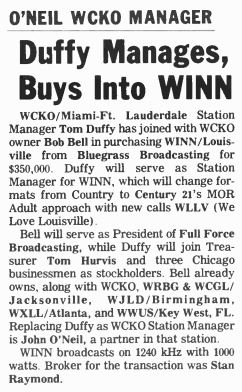 |
 |
|
WINN Newsletters |
|
These station newsletters were sent out in
the early '70s. |
|
WINN
Newsletter #1 |
WINN
Newsletter #2 |
|
WINN
Newsletter #3 |
WINN
Newsletter #4 |
|
WINN
Newsletter #5 |
WINN
Newsletter #6 |
|
WINN
Newsletter #7 |
WINN
Newsletter #8 |
|
WINN
Newsletter #9 |
WINN
Newsletter #10 |
|
WINN
Newsletter #11 |
WINN
Newsletter #12 |
|
WINN
Newsletter #13a |
WINN
Newsletter #13b |
|
WINN
Newsletter #14 |
WINN
Newsletter #15 |
|
WINN
Newsletter #16 |
|
 |
|
WINN Airchecks |
Mark Ford (April 1961)
13:38 - 6398 KB |
Bob Hughes (May 16, 1961)
30:27 - 14,276 KB |
Dan Davis (July 1961)
7:42 - 2711 KB |
Bob Lyons (September 15, 1962)
25:52 - 9095 KB |
|
Tim Lockhart (March 20, 1963)
36:50 - 17,268 KB |
Bob Lyons (April 15, 1963)
9:30 - 3345 KB |
Chuck Browning (June 1964)
26:36 - 12,470 KB |
Barney Groven (November
16, 1964)
24:08 - 11,318 KB |
Burt Mathis (1965)
29:26 - 10,347 KB |
|
Burt Mathis (1966 #1)
21:30 - 7563 KB |
Burt Mathis (1966 #2)
28:33 - 10,038 KB |
|
Burt Mathis (1966 #3)
2:51 - 1006 KB |
Burt Mathis (September 1966)
13:17 - 4675 KB |
|
Ken Douglas (Summer 1967)
5:12 - 1830 KB |
Dick Wagner (February 27,
1967)
14:30 - 5103 KB |
|
Dick Wagner (March 5,
1968)
4:16 - 1505 KB |
Moon Mullins (January
1970)
32:28 - 11,415 KB |
|
Moon Mullins (February
1970)
24:38 - 8664 KB |
Moon Mullins (Fall 1970)
26:11 - 9207 KB |
|
Moon Mullins (July 3,
1971)
22:50 - 8032 KB |
Moon Mullins (October
1971)
38:03 - 13,377 KB |
Moon Mullins (November 3,
1971)
28:00 - 9848 KB |
Moon Mullins (July 29,
1974)
27:57 - 9828 KB |
Bucks Braun
Says Goodbye to Moon Mullins (December
1974)
2:21 - 829 KB |
WINN Aircheck Composite (1975)
5:36 - 2634 KB |
Bucks Braun (April 8,
1975)
2:47 - 1311 KB |
Moon Mullins
on the day Elvis died (August 16,
1977)
1:42:36 - 36,075 KB
Like many radio stations in the country, WINN set aside their regular
programming when they heard the news about the death of Elvis Presley. On
this scoped aircheck you'll hear Moon Mullins taking calls from WINN
listeners about the impact the King of Rock and Roll had upon their lives
as the station temporarily took on an "All Elvis" format...plus there
are
several reports about Elvis' death from the ABC Entertainment Network. |
Moon Mullins (March 21,
1978)
31:34 - 11,098 KB |
Moon Mullins (May 17,
1978)
15:22 - 2440 KB |
|
Moon Mullins (June 20,
1978)
26:27 - 9299 KB |
Wretched Richard (1979)
15:22 - 5403 KB |
|
Wretched Richard (October 1979)
11:29 - 4040 KB |
Wretched Richard (December
21, 1979)
22:55 - 8060 KB |
Jack Daniel (1980)
4:19 - 1522 KB |
Jack Daniel (February
19, 1981)
1:44 - 611 KB |
|
Wretched Richard (February
1981)
12:42 - 4467 KB |
|
 |
|
WINN
Production |
|
Hack Miller Auto Sales
Commercials
2:17 - 806 KB |
Peter Pan Dry
Cleaners Commercial
2:17 - 806 KB |
|
Summers-Herman
Ford Commercials
2:05 - 735 KB |
|
WINN Jingles |
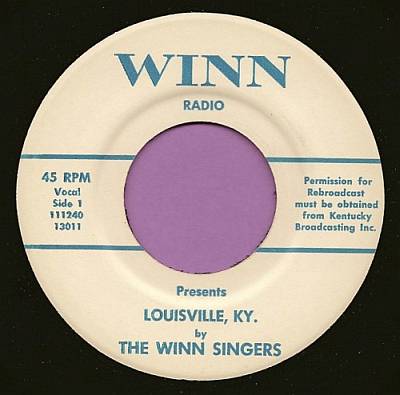 |
In 1964, WINN released a 45 rpm record with a Louisville "city song" which
was actually a
radio jingle from CRC's "Starbright" package (originally cut for WIFE,
Indianapolis).
Side B contained an instrumental from from the same jingle package. |
WINN 1964 City Song
45 Side A
1:45 - 823 KB |
WINN 1964 City Song
45 Side B
2:12 - 1034 KB |
|
WINN PAMS Series 30 Jingles
9:48 - 4595 KB |
WINN Atwood-Richards Jingles
2:34 - 1205 KB |
|
WINN PAMS Series 44A
and LS '75 Jingles
7:43 - 3617 KB |
WINN PAMS Jim Clancy Liners
14:24 - 6757 KB |
|
For more information on PAMS jingles, go to the PAMS Website. |
|
All audio is in
downloadable MP3 format. |


